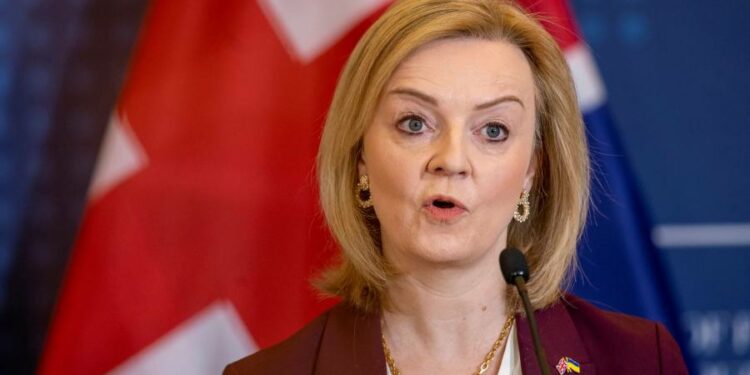UK foreign secretary Liz Truss is pushing for emergency legislation to speed up the process of sanctioning Russian oligarchs with links to President Vladimir Putin following the invasion of Ukraine.
Truss hopes to reduce the evidence threshold for proving an individual’s links to the Kremlin and introduce measures to make it easier to designate groups of individuals more quickly, according to government officials.
For years the UK has been accused of serving as a “laundromat” for “dirty” Russian money and illicit financing. Truss’s move comes as pressure mounts on the government to ratchet up sanctions against Putin’s associates as the US and EU target a greater number of individuals.
Critics point out that just last month Truss introduced sanctions legislation designed to significantly strengthen the UK’s ability to deal with Russia’s aggressive action towards Ukraine.
“I cannot understand how legislation that was designed with Russian aggression towards Ukraine in mind has been so difficult to operationalise,” said Tom Keatinge, an expert in finance and security at the Royal United Services Institute think-tank. “They don’t seem to be able to use a law that is less than a month old.”
Officials said the legislation announced last month was designed to broaden the scope of the government’s Russia sanctions regime. Truss is seeking new primary legislation to alter the UK’s overall sanctions regime, they said.
Truss on Monday said the government was working through a “hit list” of oligarchs and other figures with links to Putin, with a view to imposing sanctions on them. Ministers say they are keen to ensure sanctions are legally watertight, but in place quickly enough to prevent individuals from moving their money.
The UK announced on Thursday that it had sanctioned Igor Shuvalov, Russia’s former deputy prime minister, and Russian billionaire Alisher Usmanov, both of whom have been sanctioned by the EU.
But Britain has so far named just 11 individuals with links to Putin and privately officials admit it could still take months to impose sanctions as they grapple what they say are legal hurdles.
Meanwhile, Brussels has sanctioned more than 25 Russians. Frans Timmermans, the EU commission vice-president, quipped on Thursday that “the UK is now following our lead” on sanctioning oligarchs.
Brexit was hailed as an opportunity for the UK to set its own rules, but some government insiders suggested the translation of EU sanctions law into UK legislation in 2018 saw ministers adopt a “higher threshold” for imposing assets freezes and travel bans.
Others dismissed this suggestion. “I’m not sure the post-Brexit legislation is the issue”, said one government official. “Sanctions are difficult and they are always harder than people realise.
“But there’s also a question of whether they started work on this as soon as they should have? Should they have looked at the most sensitive political cases and started work on this earlier?”
Joshua Ray, a partner at Rahman Ravelli who works with international financial institutions on UK and US sanctions compliance, said it was “very hard” even under UK law for sanctioned individuals to successfully challenge the government.
“The government has a great degree of leeway . . . There’s not a massive amount of proof that the government has to have at the outset,” he said, noting that officials could rely on third-party sources.
He added: “I think really what’s driving the UK’s slowness to react is just the amount of Russian money that is in London, and the amount of interconnectedness between the UK and Russian economies. They’re very reluctant to disrupt that from an economic perspective.”
A senior UK Treasury insider who helped construct the EU sanctions that followed the 2014 annexation of Crimea, said the UK government was finding it harder to manage the latest sanctions against Moscow now that it was outside the bloc.
“Building legally watertight sanctions against individuals in Russia is a hugely complicated business, and doing it alone is just harder, and it takes longer,” the insider added.
Foreign Office officials said staff were being drafted in to work in the department’s sanctions unit with no previous experience of the legislation.
Under the sanctions and anti-money laundering act of 2018, the government must provide evidence of “reasonable grounds” to sanction an individual. Officials say this makes imposing measures more legally onerous and time consuming.
“It is considerably easier and faster to start, and potentially win, a judicial review in the High Court against a UK sanctions decision than it is to successfully prosecute a direct action in the General Court of the CJEU [Court of Justice of the European Union] in Luxembourg,” said Philip Moser QC.
“There is therefore a big difference between being the UK government trying to sanction people in a way that will stick and being the EU Commission which can sanction on a slimmer factual basis relatively insulated from effective challenge.”











